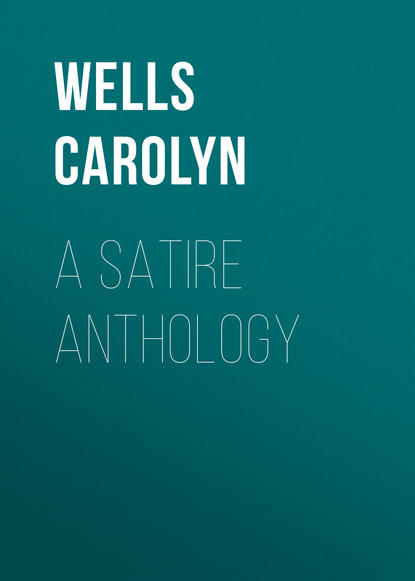По всем вопросам обращайтесь на: info@litportal.ru
(©) 2003-2025.
✖
A Satire Anthology
Автор
Год написания книги
2017
Настройки чтения
Размер шрифта
Высота строк
Поля
IT was the little leaves beside the road.
Said Grass: “What is that sound
So dismally profound,
That detonates and desolates the air?”
“That is St. Peter’s bell,”
Said rain-wise Pimpernel;
“He is music to the godly,
Though to us he sounds so oddly,
And he terrifies the faithful unto prayer.”
Then something very like a groan
Escaped the naughty little leaves.
Said Grass: “And whither track
These creatures all in black,
So woebegone and penitent and meek?”
“They’re mortals bound for church,”
Said the little Silver Birch;
“They hope to get to heaven,
And have their sins forgiven,
If they talk to God about it once a week.”
And something very like a smile
Ran through the naughty little leaves.
Said Grass: “What is that noise
That startles and destroys
Our blessed summer brooding when we’re tired?”
“That’s folk a-praising God,”
Said the tough old cynic Clod;
“They do it every Sunday,
They’ll be all right on Monday;
It’s just a little habit they’ve acquired.”
And laughter spread among the little leaves.
Bliss Carman.
THE EVOLUTION OF A “NAME”
WHEN Hill, the poet, first essayed
To push the goose’s quill,
Scarce any name at all he made:
(’Twas simply “A. H. Hill.”)
But as success his efforts crowned,
Rewarding greater skill,
His name expanded at a bound:
(It was “A. Hiller Hill.”)
Now that his work, be what it may,
Is sure to “fill the bill,”
He has a name as wide as day:
(“Aquilla Hiller Hill.”)
Charles Battell Loomis.
“THE HURT THAT HONOUR FEELS”
SUGGESTED BY THE ATTITUDE OF THE FRENCH PRESS ON THE FASHODA QUESTION
THAT man is surely in the wrong,
And lets his angry passions blind him,
Who, when a person comes along
Behind him,
And hits him hard upon the cheek
(One whom he took to be his brother),
Declines to turn and let him tweak
The other.
It should be his immediate care,
By delicate and tactful dealings,
To ease the striker’s pain, and spare
His feelings;
Nor should he, for his private ends,
Make any personal allusion
Tending to aggravate his friend’s
Confusion.
For there are people built this way:
They may have scratched your face, or bent it,
Yet, if you reason with them, they
Resent it!
Their honour, quickly rendered sore,
Demands that you should suffer mutely,
Lest they should feel it even more
Acutely.
I knew a man of perfect tact;
He caught a burglar once, my man did;
He took him in the very act,
Red-handed;
What kind of language then occurred?
How did he comment on the jemmy?
Did he employ some brutal word
Said Grass: “What is that sound
So dismally profound,
That detonates and desolates the air?”
“That is St. Peter’s bell,”
Said rain-wise Pimpernel;
“He is music to the godly,
Though to us he sounds so oddly,
And he terrifies the faithful unto prayer.”
Then something very like a groan
Escaped the naughty little leaves.
Said Grass: “And whither track
These creatures all in black,
So woebegone and penitent and meek?”
“They’re mortals bound for church,”
Said the little Silver Birch;
“They hope to get to heaven,
And have their sins forgiven,
If they talk to God about it once a week.”
And something very like a smile
Ran through the naughty little leaves.
Said Grass: “What is that noise
That startles and destroys
Our blessed summer brooding when we’re tired?”
“That’s folk a-praising God,”
Said the tough old cynic Clod;
“They do it every Sunday,
They’ll be all right on Monday;
It’s just a little habit they’ve acquired.”
And laughter spread among the little leaves.
Bliss Carman.
THE EVOLUTION OF A “NAME”
WHEN Hill, the poet, first essayed
To push the goose’s quill,
Scarce any name at all he made:
(’Twas simply “A. H. Hill.”)
But as success his efforts crowned,
Rewarding greater skill,
His name expanded at a bound:
(It was “A. Hiller Hill.”)
Now that his work, be what it may,
Is sure to “fill the bill,”
He has a name as wide as day:
(“Aquilla Hiller Hill.”)
Charles Battell Loomis.
“THE HURT THAT HONOUR FEELS”
SUGGESTED BY THE ATTITUDE OF THE FRENCH PRESS ON THE FASHODA QUESTION
THAT man is surely in the wrong,
And lets his angry passions blind him,
Who, when a person comes along
Behind him,
And hits him hard upon the cheek
(One whom he took to be his brother),
Declines to turn and let him tweak
The other.
It should be his immediate care,
By delicate and tactful dealings,
To ease the striker’s pain, and spare
His feelings;
Nor should he, for his private ends,
Make any personal allusion
Tending to aggravate his friend’s
Confusion.
For there are people built this way:
They may have scratched your face, or bent it,
Yet, if you reason with them, they
Resent it!
Their honour, quickly rendered sore,
Demands that you should suffer mutely,
Lest they should feel it even more
Acutely.
I knew a man of perfect tact;
He caught a burglar once, my man did;
He took him in the very act,
Red-handed;
What kind of language then occurred?
How did he comment on the jemmy?
Did he employ some brutal word











